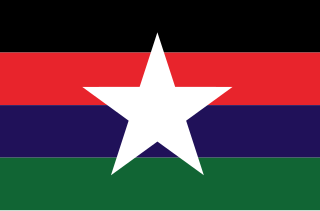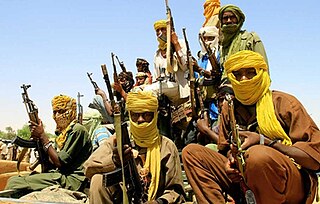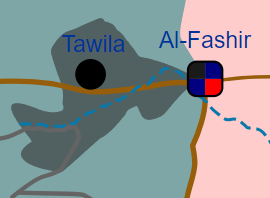
Geneina is a city in West Darfur, part of the dar Masalit region, in Sudan. It joined British Sudan at the end of 1919 through the Gilani Agreement, signed between the Masalit Sultanate and the United Kingdom, according to which it became a territory.

The Sudan Liberation Movement/Army is a Sudanese rebel group active in Darfur, Sudan. It was founded as the Darfur Liberation Front by members of three indigenous ethnic groups in Darfur: the Fur, the Zaghawa, and the Masalit, among whom were the leaders Abdul Wahid al-Nur of the Fur and Minni Minnawi of the Zaghawa.

The War in Darfur, also nicknamed the Land Cruiser War, was a major armed conflict in the Darfur region of Sudan that began in February 2003 when the Sudan Liberation Movement (SLM) and the Justice and Equality Movement (JEM) rebel groups began fighting against the government of Sudan, which they accused of oppressing Darfur's non-Arab population. The government responded to attacks by carrying out a campaign of ethnic cleansing against Darfur's non-Arabs. This resulted in the death of hundreds of thousands of civilians and the indictment of Sudan's president, Omar al-Bashir, for genocide, war crimes, and crimes against humanity by the International Criminal Court.
Sudan is a source country for men, women and children trafficked internally for the purposes of forced labor and sexual exploitation. Sudan is also a transit and destination country for Ethiopian women trafficked abroad for domestic servitude. Sudanese women and girls are trafficked within the country, as well as possibly to Middle Eastern countries such as Qatar, for domestic servitude. U.S. State Department's Office to Monitor and Combat Trafficking in Persons placed the country in "Tier 3" in 2017. In 2020, Sudan was once again placed in the "Tier 3" category, since the latest Trafficking in Persons report showed that South Sudan had not made any prosecutions of human traffickers or convicted any individuals in connection with forced conscription of children into the armed forces in the last 5 years.

The Sudanese conflict in South Kordofan and Blue Nile was an armed conflict in the Sudanese states of South Kordofan and Blue Nile between the Sudanese Armed Forces (SAF) and the Sudan People's Liberation Movement–North (SPLM-N), a northern affiliate of the Sudan People's Liberation Movement (SPLM) in South Sudan. After some years of relative calm following the 2005 agreement which ended the second Sudanese civil war between the Sudanese government and SPLM rebels, fighting broke out again in the lead-up to South Sudan independence on 9 July 2011, starting in South Kordofan on 5 June and spreading to the neighboring Blue Nile state in September. SPLM-N, splitting from newly independent SPLM, took up arms against the inclusion of the two southern states in Sudan with no popular consultation and against the lack of democratic elections. The conflict is intertwined with the War in Darfur, since in November 2011 SPLM-N established a loose alliance with Darfuri rebels, called Sudan Revolutionary Front (SRF).
Sudan is a country that is half desert and much of the population suffers from a shortage of clean drinking water as well as a reliable source of water for agriculture. With the Nile river in the east of the country, parts of Sudan have substantial water resources, but those in the west have to rely on wadis, seasonal wells which often dry up. These imbalances in water availability are a source of hardship, as well as a source of conflict. While storage facilities are limited, many local communities have constructed makeshift dams and reservoirs, weirs, which help in stabilizing farming communities. Farmers also utilize hafirs to store rain water which falls in the rainy season, but groundwater remains a vital source of water for over 80% of Sudanese people. For decades, political instability has led to terrible conditions and thwarted many projects and relief efforts, but aid is making its way through. Several water infrastructure projects have been enacted in recent years, with both domestic and international sources of funding. Funding from the UN has provided 9,550 local farmers with better access to water and fertile soils. A project which also plans to replant forest cover in the wadi to reverse desertification.
The Sudanese peace process consists of meetings, written agreements and actions that aim to resolve the War in Darfur, the Sudanese conflict in South Kordofan and Blue Nile, and armed conflicts in central, northern and eastern Sudan.

A civil war between two rival factions of the military government of Sudan, the Sudanese Armed Forces (SAF) under Abdel Fattah al-Burhan, and the paramilitary Rapid Support Forces (RSF) under the Janjaweed leader Hemedti, began during Ramadan on 15 April 2023. Fighting has been concentrated around the capital city of Khartoum and the Darfur region. As of 21 January 2024, at least 13,000–15,000 people had been killed and 33,000 others were injured. As of 5 July 2024, over 7.7 million were internally displaced and more than 2.1 million others had fled the country as refugees, and many civilians in Darfur have been reported dead as part of the Masalit massacres.

The Geneina massacre, also the Battle of Geneina, was a series of battles for control of Geneina, the capital of West Darfur in Sudan, between the paramilitary Rapid Support Forces (RSF) and allied militias against Masalit self-defense militias and the Sudanese Alliance. The battles primarily lasted between April 24 and June 14, with major attacks and massacres by the RSF and allied militias on Masalit civilians in the city. After the killing of West Darfur governor Khamis Abakar on June 14, thousands of Masalit civilians were slaughtered in the city between June 14 and June 22 by the RSF and allied militias.

The Darfur campaign or Darfur offensive is a theatre of operation in the war in Sudan that affects five states in Darfur: South Darfur, East Darfur, North Darfur, Central Darfur and West Darfur. The offensive mainly started on 15 April 2023 in West Darfur where the Rapid Support Forces (RSF) forces captured Geneina, the conflict came after several days of high tensions between the forces and the government.
The following is a timeline of the Sudanese civil war (2023–present) in 2023.
The Battle of Nyala was a battle for control of Nyala, the capital of South Darfur in Sudan, between the paramilitary Rapid Support Forces (RSF), and the Sudanese Armed Forces during the ongoing Darfur campaign. The first battle occurred between 15 and 20 April 2023, during which hundreds were reported dead. A civilian-brokered ceasefire paused the fighting by April 20. Sporadic clashes broke out between May and July. In August 2023, the RSF launched an offensive on the city. The SAF launched air campaigns against the RSF in Nyala, with many civilian casualties in Taiba and El Matar. In late September, the RSF besieged the headquarters the SAF's 16th Infantry Division headquarters, capturing it on October 26.

The siege of El Fasher is an ongoing battle for control of the town of El Fasher in North Darfur during the Sudan conflict. The first battle for the city took place between 15 and 20 April 2023, and resulted in a ceasefire that held until 12 May. Clashes broke out again between 12 and 29 May, and ended with a more stable ceasefire that lasted until August. By September, the city had become a haven for refugees across the region, without enough food and water.

The siege of El Obeid was a siege in El-Obeid, North Kordofan, Sudan, during the 2023 Sudan conflict. The battle began on April 15, and saw the Rapid Support Forces (RSF) capture the El Obeid airport from the Sudanese Army contingent in the city. Throughout April and May, the Sudanese Army repelled several RSF assaults on the city, although by May 30, the RSF fully surrounded the city and laid siege to it.
The Battle of Kutum was a conflict during the War in Sudan which occurred in and around the town of Kutum in North Darfur. The Rapid Support Forces quickly overran the city, and carried out massacres in the city and the neighboring Kassab IDP camp. The group then attacked neighboring villages in early June.

The civil war in Sudan, which started on 15 April 2023, has seen widespread war crimes committed by both the Sudanese Armed Forces (SAF) and the Rapid Support Forces (RSF), with the RSF being singled out by the Human Rights Watch, and the United Kingdom and United States governments for committing ethnic cleansing and crimes against humanity.
The Darfur Joint Protection Force, or more simply the Joint Darfur Force/Joint Force, is a formerly defensive force that was set up during the Battle of El Fasher claiming to neutrally protect civilians during the War in Sudan (2023) by peacekeeping. It was formed on 27 April 2023 by four former rebel groups and signatures of the Juba peace agreement. The participating groups are SLM-Minawi, the Justice and Equality Movement, the Sudanese Alliance, and the Gathering of Sudan Liberation Forces. It is currently led by Darfur Region Governor Minni Minnawi.
The following lists events during 2024 in the Republic of the Sudan.
The following is a timeline of the Sudanese civil war (2023–present) in 2024.

Ali Yaqoub Gibril was a Sudanese military leader in the Rapid Support Forces (RSF). He was accused of leading military operations that caused significant human rights violations in Darfur. Jibril started his career as a tribal militia leader in Central Darfur, where he was accused of committing crimes against an ethnic group. Later, he joined the RSF and took command in Central Darfur.









